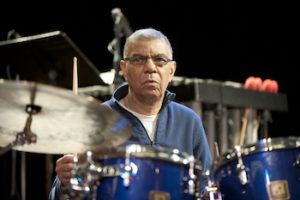
Jack DeJohnette
*Jack DeJohnette was born on this date in 1942. He is a Black jazz drummer, pianist, and composer from Chicago, Illinois.
He began his musical career as a pianist, studying from age four and first playing professionally at age fourteen. He later switched focus to the drums. DeJohnette credits his uncle, Roy I. Wood Sr., a Chicago disc jockey and vice president of the National Network of Black Broadcasters, as his inspiration to play music. DeJohnette played R&B, hard bop, and avant-garde music in Chicago. He led his groups and occasionally performed with Sun Ra and his Arkestra. In the early 1960s, DeJohnette sat in with John Coltrane and his quintet, an early foray into playing with big-name jazz musicians.
In 1966, DeJohnette moved to New York City, where he became a member of the Charles Lloyd Quartet. Lloyd's group was where DeJohnette first encountered pianist Keith Jarrett, who would work extensively with him throughout his career. However, DeJohnette left the group in early 1968, citing Lloyd's deteriorating, "flat" playing as his main reason for leaving. It was not the only group DeJohnette played with during his early years in New York. He also worked with groups including Jackie McLean, Abbey Lincoln, Betty Carter, and Bill Evans. In November 1968, he worked briefly with Stan Getz and his quartet, which led to his first recordings with Miles Davis. In 1969, DeJohnette left the Evans trio and replaced Tony Williams in Miles Davis's live band.
Davis had seen DeJohnette play many times; Davis recognized DeJohnette's ability to combine the driving grooves associated with rock and roll with improvisational aspects related to jazz. DeJohnette played on the compilation album Directions and was the primary drummer on Bitches Brew. DeJohnette and the other musicians saw the Bitches Brew sessions as unstructured and fragmentary but also innovative: "As the music was being played, as it was developing, Miles would get new ideas...He’d do a take and stop, and then get an idea from what had just gone on before and elaborate on it. The recording of Bitches Brew was a stream of creative musical energy. One thing was flowing into the next, and we were stopping and starting all the time."
While he was not the only drummer involved in the project, as Davis had also enlisted Billy Cobham, Don Alias, and Lenny White, DeJohnette was considered the leader of the rhythm section within the group. He played on the live albums that would follow the release of Bitches Brew, taken from concerts at the Fillmore East in New York and Fillmore West in San Francisco. These ventures were undertaken at the behest of Clive Davis. DeJohnette continued to work with Davis for the next three years, which led to collaborations with other Davis band members, John McLaughlin, Chick Corea, and Holland; he also drew Keith Jarrett into the band. He contributed to such Davis albums as Live-Evil (1971), Jack Johnson (1971), and On the Corner (1972).
He left the Davis group in the middle of 1971, although he returned for several concerts through the rest of that year. An essential figure of the fusion era of jazz, DeJohnette is one of the most influential jazz drummers of the 20th century, given his extensive work as a leader and sideman for musicians including Charles Lloyd, Freddie Hubbard, Keith Jarrett, Bill Evans, John Abercrombie, Alice Coltrane, Sonny Rollins, Miles Davis, Joe Henderson, Michael Brecker, Herbie Hancock, and John Scofield. He was inducted into the Modern Drummer Hall of Fame in 2007 and into the Percussive Arts Society Hall of Fame in 2010.